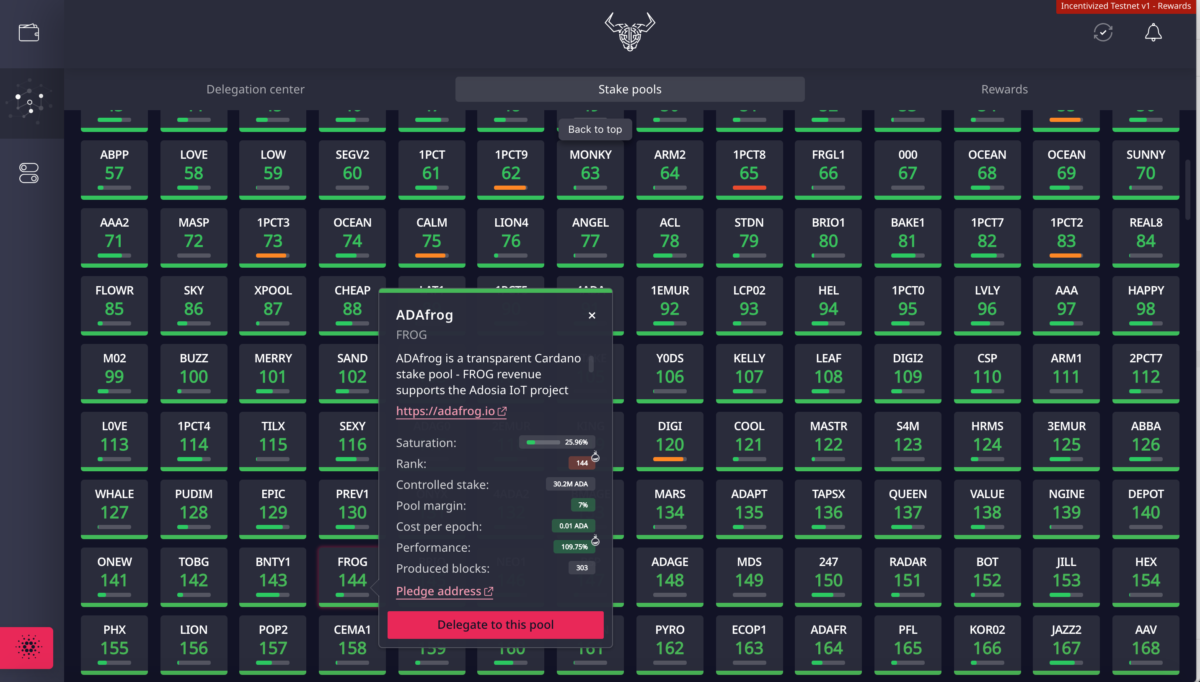As a Cardano holder, you can easily learn how to stake Cardano, learn to stake Cardano like a pro, and learn how staking Cardano works to earn passive ADA rewards on the Cardano held in either your Daedalus, Yoroi or Ledger wallets.
To earn Cardano rewards you will need to use your wallet to “delegate” your ADA to an active Cardano to a stake pool. Delegating your Cardano is as simple as choosing an address balance you want to delegate, searching for a stake pool by ticker in your wallet (our pool ticker is FROG), and clicking a button delegate. Delegating your Cardano to a stake pool is also know as “staking” your Cardano.
Learn to stake Cardano and how to stake Cardano by watching this video from FROG friend DIGI showing how to delegate Cardano using the Daedalus wallet for Incentivized Testnet (we’ll update this video to show how to delegate on both Yoroi and Daedalus once staking goes live on mainnet).
When you stake your ADA to a Cardano stake pool, you are only assigning your coins’ delegation power to that stake pool, and never the coins’ spending power. This means your Cardano coins are always in your control – they are never locked up and they can be spent or moved at any time. When delegating / staking to a pool you are still in complete control of your Cardano and coins, and can remove delegation or delegate to a different Cardano stake pool any time you choose.
How to stake Cardano to earn rewards
To earn Cardano ADA rewards by staking, the Cardano stake pool you are delegating to must mint blocks for the Cardano network. To mint blocks in a manner that provides delegators with a healthy return on staking (ROS), a Cardano stake pool must be operable, optimized and also have a sizable amount of Cardano delegated to the pool. Each Cardano stake pool earns rewards for every block minted, which are then distributed to that stake pool’s delegators proportionally based on the amount of ADA each delegator has staked to that pool. Following each epoch a (typically) small and constant pool tax is automatically deducted from the total rewards earned by any given stake pool and paid out to the stake pool operator prior to distributing the remaining rewards to the pool’s delegators.
All Cardano stake pools participate in a slot lottery at the beginning of each epoch (an epoch currently only lasts one day during testnet, but will likely be 4 or 5 days long during mainnet). This regular slot lottery election determines how many slots (a two second window within an epoch) a stake pool is assigned an opportunity to mint a block for the Cardano network. The number of slots a Cardano stake pool can be elected to produce a block for each epoch depends strictly on the total amount of Cardano staked that pool.
For example, a Cardano stake pool having very little ADA staked / delegated (say 50k ADA) will rarely be assigned a slots and thus very rarely mint blocks. But when that pool does mint a block, nearly all the rewards will be spread across the small number of delegators. A Cardano stake pool currently needs to have around 2M ADA delegated to be assigned one slot per epoch on average. This number (minimum amount of stake for a pool to average one assigned slot per epoch) will increase as the total amount of ADA delegated increased.
Unlike other proof of stake systems, one really cool aspect of the Cardano network protocol is delegator rewards are automatically paid out to the delegator by the protocol. This makes the delegator / pool operator relationship far more trustless! When you learn to stake Cardano, you understand how easy it becomes to earn passive rewards on your Cardano holdings.
Why staking Cardano is important
Learning how to stake Cardano and actually staking your Cardano is important for two main reasons. First off, the Cardano network becomes more secure as more of the Cardano supply is delegated to stake pools.
The second reason is the Cardano supply actually increases with each new block minted, and staking your Cardano (hence earning yourself additional ADA rewards) will help greatly in serving to offset any effects of inflation due to staking rewards being released over time.
Aside from losing your private keys or recovery seed phrase, not delegating and staking your Cardano to a stake pool is quite possibly the worst thing you can do for your ADA holdings!
How to choose a great stake pool
We’ll write up a separate article on the best Cardano stake pools soon, but here are some tips on how to choose a great stake pool.
First to choose a great stake pool you will want to ensure your target stake pool has enough Cardano delegated and is regularly minting blocks. You can sometimes get lucky and earn higher ROS on pools with smaller delegation, but you’ll want to follow this rule of thumb if you prefer the “set and forget” method of delegating.
Also you will want to look for a pool having a decent social presence – this will help add pressure the relevant pool to continuously perform. A pool with good social presence and communication history will be far less likely to shut down without warning, and will be far more likely to go above and beyond to ensure as best of performance as possible for their pool.
Another important factor to keep in mind are pool taxes. While many pools offer extremely low fees (sub 5% tax), these pools often entail zero or minimal profits which often directly translates to either a lower quality setup and / or a minimal amount of effort a stake pool operator can contribute to maintaining the pool. We suggest focusing on ROS over pool taxes, as stake pools that have “healthy” pool taxes will more than often outperform stake pools with lower tax rates.
You might also want to keep an eye out for stake pools that are directing their pool rewards to support causes. Some pools direct their revenue to support charities whereas others support Cardano projects.
For example, FROG pool tax is 7.49%, outperforms a great number of 0% and 1% stake pools, and also directs pool revenue to support ongoing development for the Adosia IoT project which is aligning to tokenize on Cardano.
You can visit PoolTool.io to view and compare all the Cardano stake pools and even view their historical performance by epoch. PoolTool also shows real-time competitive slot action between pools where you can also compare any given pool’s competitive slot win / loss history. A competitive slot happens when one or more pool is assigned the exact same slot to produce a block. The pool that propagates their block across the network the fastest wins the block reward for their delegators, so understanding a pool’s competitive slot win / loss history can also be helpful.
Avoid Saturated Stake Pools
Cardano stake pools that accumulate too much stake can become “saturated”, meaning the total rewards are capped regardless of how many blocks are produced by the saturated pool. Delegating to a saturated pool should be avoided whenever possible, as the total (capped) rewards will still be distributed proportionally across the total delegation to that pool – which means the more saturated a pool is, the less the ADA rewards realized per ADA delegated.
If you find you are delegating to a saturated pool, it is advised to move your delegation to a performing stake pool having less overall delegated stake.
More on learning to stake Cardano
When you delegate to a new pool, the new delegation takes effect within two (2) epochs – more precisely, delegation changes take effect at the end of the current epoch plus one full epoch.
One extremely important aspect to understand when you learn to stake Cardano is the rewards a pool generates will vary from epoch to epoch. This is due to the fact a pool’s slot lotteries can (and will) vary drastically from epoch to epoch, so you will want to be patient with your stake pool and not necessarily re-delegate your Cardano away in haste to a different pool just because your pool has a bad epoch or two – particularly if your pool is producing blocks and has a solid track record.
Furthermore, the ADA rewarded per block minted across the network will also vary. When the network and most pools are collectively performing well, the reward per block will be lower as most pools will be hitting their assigned slots. When more pools are missing a higher percentage of blocks than usual, the reward per block minted will be higher than average.
Last, it’s great to know you can spend or receive ADA without having to worry about changing or updating your delegation. Any ADA you receive will be automatically delegated to the pool to which the recipient address is currently delegating, and any ADA you spend will automatically be removed from your amount delegated.
As you may have found, learning to stake Cardano like a pro is fairly straightforward. Let us know what you think in the comments below or how we might be able to improve! If you would like to support ADAfrog, you can either delegate to FROG or check out the Adosia IoT Platform


1 reply on “Learn to Stake Cardano Like a Pro”
I’ve been thinking I must ask about staking and then saw this, so thanks v much – v helpful.